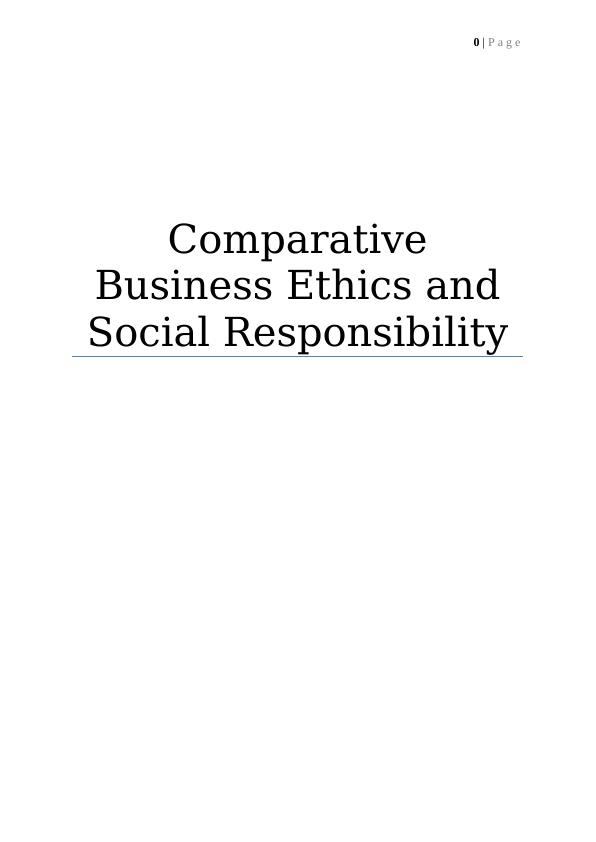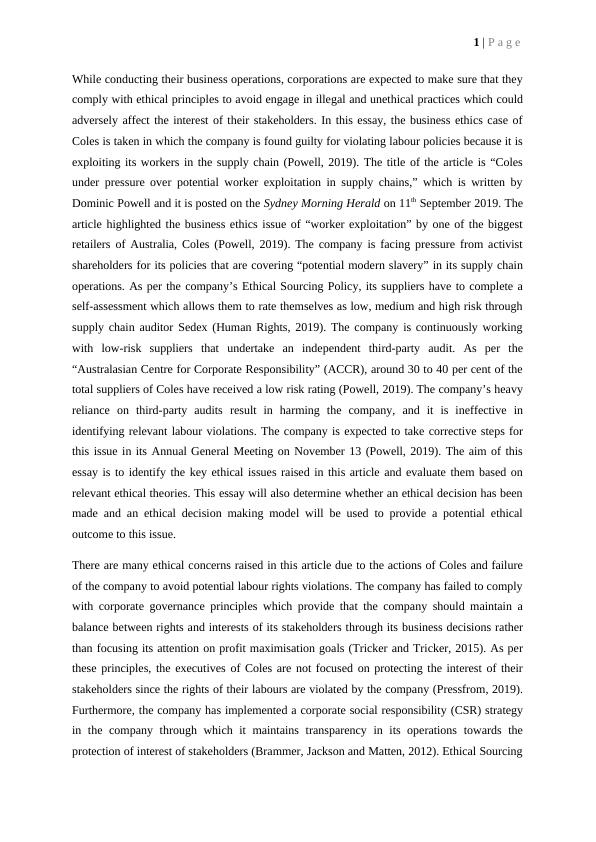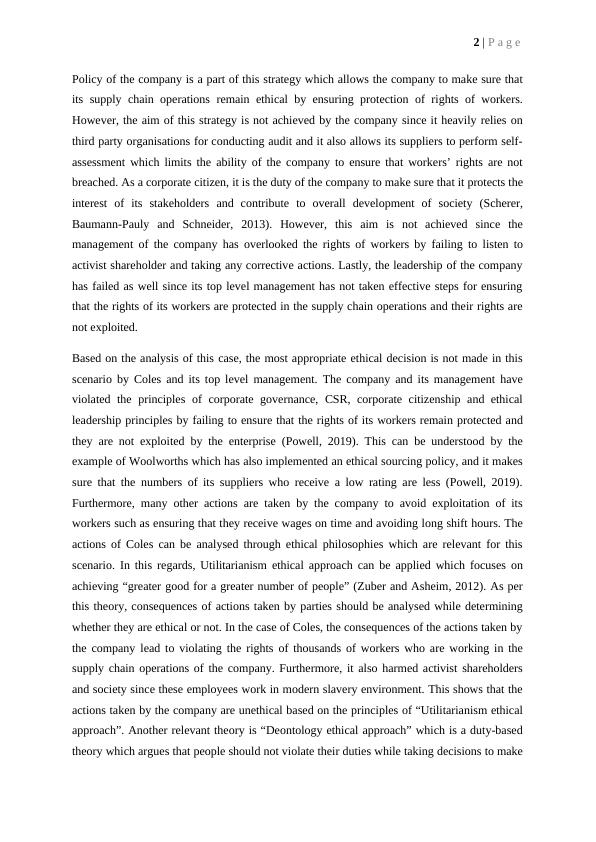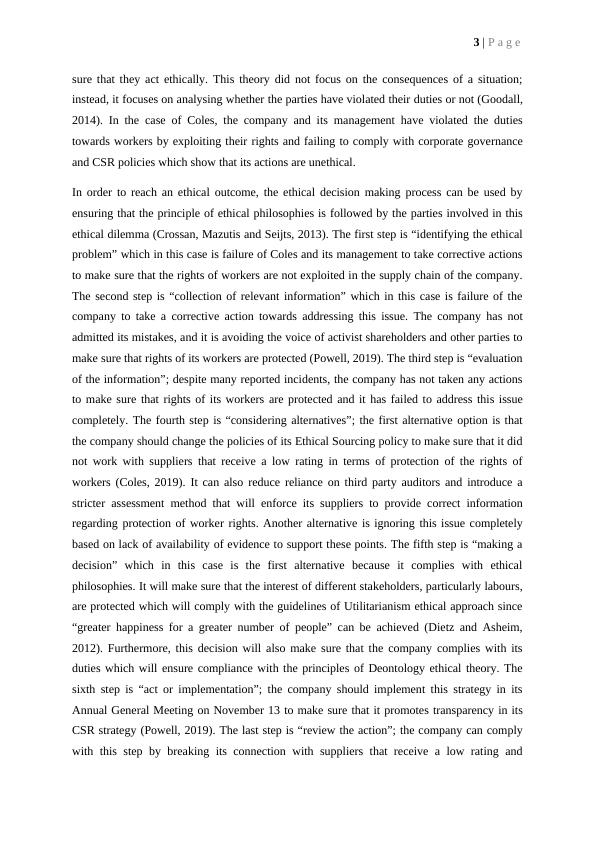Comparative Business Ethics and Social Responsibility
Added on 2022-11-18
11 Pages2150 Words224 Views
0 | P a g e
Comparative
Business Ethics and
Social Responsibility
Comparative
Business Ethics and
Social Responsibility

1 | P a g e
While conducting their business operations, corporations are expected to make sure that they
comply with ethical principles to avoid engage in illegal and unethical practices which could
adversely affect the interest of their stakeholders. In this essay, the business ethics case of
Coles is taken in which the company is found guilty for violating labour policies because it is
exploiting its workers in the supply chain (Powell, 2019). The title of the article is “Coles
under pressure over potential worker exploitation in supply chains,” which is written by
Dominic Powell and it is posted on the Sydney Morning Herald on 11th September 2019. The
article highlighted the business ethics issue of “worker exploitation” by one of the biggest
retailers of Australia, Coles (Powell, 2019). The company is facing pressure from activist
shareholders for its policies that are covering “potential modern slavery” in its supply chain
operations. As per the company’s Ethical Sourcing Policy, its suppliers have to complete a
self-assessment which allows them to rate themselves as low, medium and high risk through
supply chain auditor Sedex (Human Rights, 2019). The company is continuously working
with low-risk suppliers that undertake an independent third-party audit. As per the
“Australasian Centre for Corporate Responsibility” (ACCR), around 30 to 40 per cent of the
total suppliers of Coles have received a low risk rating (Powell, 2019). The company’s heavy
reliance on third-party audits result in harming the company, and it is ineffective in
identifying relevant labour violations. The company is expected to take corrective steps for
this issue in its Annual General Meeting on November 13 (Powell, 2019). The aim of this
essay is to identify the key ethical issues raised in this article and evaluate them based on
relevant ethical theories. This essay will also determine whether an ethical decision has been
made and an ethical decision making model will be used to provide a potential ethical
outcome to this issue.
There are many ethical concerns raised in this article due to the actions of Coles and failure
of the company to avoid potential labour rights violations. The company has failed to comply
with corporate governance principles which provide that the company should maintain a
balance between rights and interests of its stakeholders through its business decisions rather
than focusing its attention on profit maximisation goals (Tricker and Tricker, 2015). As per
these principles, the executives of Coles are not focused on protecting the interest of their
stakeholders since the rights of their labours are violated by the company (Pressfrom, 2019).
Furthermore, the company has implemented a corporate social responsibility (CSR) strategy
in the company through which it maintains transparency in its operations towards the
protection of interest of stakeholders (Brammer, Jackson and Matten, 2012). Ethical Sourcing
While conducting their business operations, corporations are expected to make sure that they
comply with ethical principles to avoid engage in illegal and unethical practices which could
adversely affect the interest of their stakeholders. In this essay, the business ethics case of
Coles is taken in which the company is found guilty for violating labour policies because it is
exploiting its workers in the supply chain (Powell, 2019). The title of the article is “Coles
under pressure over potential worker exploitation in supply chains,” which is written by
Dominic Powell and it is posted on the Sydney Morning Herald on 11th September 2019. The
article highlighted the business ethics issue of “worker exploitation” by one of the biggest
retailers of Australia, Coles (Powell, 2019). The company is facing pressure from activist
shareholders for its policies that are covering “potential modern slavery” in its supply chain
operations. As per the company’s Ethical Sourcing Policy, its suppliers have to complete a
self-assessment which allows them to rate themselves as low, medium and high risk through
supply chain auditor Sedex (Human Rights, 2019). The company is continuously working
with low-risk suppliers that undertake an independent third-party audit. As per the
“Australasian Centre for Corporate Responsibility” (ACCR), around 30 to 40 per cent of the
total suppliers of Coles have received a low risk rating (Powell, 2019). The company’s heavy
reliance on third-party audits result in harming the company, and it is ineffective in
identifying relevant labour violations. The company is expected to take corrective steps for
this issue in its Annual General Meeting on November 13 (Powell, 2019). The aim of this
essay is to identify the key ethical issues raised in this article and evaluate them based on
relevant ethical theories. This essay will also determine whether an ethical decision has been
made and an ethical decision making model will be used to provide a potential ethical
outcome to this issue.
There are many ethical concerns raised in this article due to the actions of Coles and failure
of the company to avoid potential labour rights violations. The company has failed to comply
with corporate governance principles which provide that the company should maintain a
balance between rights and interests of its stakeholders through its business decisions rather
than focusing its attention on profit maximisation goals (Tricker and Tricker, 2015). As per
these principles, the executives of Coles are not focused on protecting the interest of their
stakeholders since the rights of their labours are violated by the company (Pressfrom, 2019).
Furthermore, the company has implemented a corporate social responsibility (CSR) strategy
in the company through which it maintains transparency in its operations towards the
protection of interest of stakeholders (Brammer, Jackson and Matten, 2012). Ethical Sourcing

2 | P a g e
Policy of the company is a part of this strategy which allows the company to make sure that
its supply chain operations remain ethical by ensuring protection of rights of workers.
However, the aim of this strategy is not achieved by the company since it heavily relies on
third party organisations for conducting audit and it also allows its suppliers to perform self-
assessment which limits the ability of the company to ensure that workers’ rights are not
breached. As a corporate citizen, it is the duty of the company to make sure that it protects the
interest of its stakeholders and contribute to overall development of society (Scherer,
Baumann-Pauly and Schneider, 2013). However, this aim is not achieved since the
management of the company has overlooked the rights of workers by failing to listen to
activist shareholder and taking any corrective actions. Lastly, the leadership of the company
has failed as well since its top level management has not taken effective steps for ensuring
that the rights of its workers are protected in the supply chain operations and their rights are
not exploited.
Based on the analysis of this case, the most appropriate ethical decision is not made in this
scenario by Coles and its top level management. The company and its management have
violated the principles of corporate governance, CSR, corporate citizenship and ethical
leadership principles by failing to ensure that the rights of its workers remain protected and
they are not exploited by the enterprise (Powell, 2019). This can be understood by the
example of Woolworths which has also implemented an ethical sourcing policy, and it makes
sure that the numbers of its suppliers who receive a low rating are less (Powell, 2019).
Furthermore, many other actions are taken by the company to avoid exploitation of its
workers such as ensuring that they receive wages on time and avoiding long shift hours. The
actions of Coles can be analysed through ethical philosophies which are relevant for this
scenario. In this regards, Utilitarianism ethical approach can be applied which focuses on
achieving “greater good for a greater number of people” (Zuber and Asheim, 2012). As per
this theory, consequences of actions taken by parties should be analysed while determining
whether they are ethical or not. In the case of Coles, the consequences of the actions taken by
the company lead to violating the rights of thousands of workers who are working in the
supply chain operations of the company. Furthermore, it also harmed activist shareholders
and society since these employees work in modern slavery environment. This shows that the
actions taken by the company are unethical based on the principles of “Utilitarianism ethical
approach”. Another relevant theory is “Deontology ethical approach” which is a duty-based
theory which argues that people should not violate their duties while taking decisions to make
Policy of the company is a part of this strategy which allows the company to make sure that
its supply chain operations remain ethical by ensuring protection of rights of workers.
However, the aim of this strategy is not achieved by the company since it heavily relies on
third party organisations for conducting audit and it also allows its suppliers to perform self-
assessment which limits the ability of the company to ensure that workers’ rights are not
breached. As a corporate citizen, it is the duty of the company to make sure that it protects the
interest of its stakeholders and contribute to overall development of society (Scherer,
Baumann-Pauly and Schneider, 2013). However, this aim is not achieved since the
management of the company has overlooked the rights of workers by failing to listen to
activist shareholder and taking any corrective actions. Lastly, the leadership of the company
has failed as well since its top level management has not taken effective steps for ensuring
that the rights of its workers are protected in the supply chain operations and their rights are
not exploited.
Based on the analysis of this case, the most appropriate ethical decision is not made in this
scenario by Coles and its top level management. The company and its management have
violated the principles of corporate governance, CSR, corporate citizenship and ethical
leadership principles by failing to ensure that the rights of its workers remain protected and
they are not exploited by the enterprise (Powell, 2019). This can be understood by the
example of Woolworths which has also implemented an ethical sourcing policy, and it makes
sure that the numbers of its suppliers who receive a low rating are less (Powell, 2019).
Furthermore, many other actions are taken by the company to avoid exploitation of its
workers such as ensuring that they receive wages on time and avoiding long shift hours. The
actions of Coles can be analysed through ethical philosophies which are relevant for this
scenario. In this regards, Utilitarianism ethical approach can be applied which focuses on
achieving “greater good for a greater number of people” (Zuber and Asheim, 2012). As per
this theory, consequences of actions taken by parties should be analysed while determining
whether they are ethical or not. In the case of Coles, the consequences of the actions taken by
the company lead to violating the rights of thousands of workers who are working in the
supply chain operations of the company. Furthermore, it also harmed activist shareholders
and society since these employees work in modern slavery environment. This shows that the
actions taken by the company are unethical based on the principles of “Utilitarianism ethical
approach”. Another relevant theory is “Deontology ethical approach” which is a duty-based
theory which argues that people should not violate their duties while taking decisions to make

3 | P a g e
sure that they act ethically. This theory did not focus on the consequences of a situation;
instead, it focuses on analysing whether the parties have violated their duties or not (Goodall,
2014). In the case of Coles, the company and its management have violated the duties
towards workers by exploiting their rights and failing to comply with corporate governance
and CSR policies which show that its actions are unethical.
In order to reach an ethical outcome, the ethical decision making process can be used by
ensuring that the principle of ethical philosophies is followed by the parties involved in this
ethical dilemma (Crossan, Mazutis and Seijts, 2013). The first step is “identifying the ethical
problem” which in this case is failure of Coles and its management to take corrective actions
to make sure that the rights of workers are not exploited in the supply chain of the company.
The second step is “collection of relevant information” which in this case is failure of the
company to take a corrective action towards addressing this issue. The company has not
admitted its mistakes, and it is avoiding the voice of activist shareholders and other parties to
make sure that rights of its workers are protected (Powell, 2019). The third step is “evaluation
of the information”; despite many reported incidents, the company has not taken any actions
to make sure that rights of its workers are protected and it has failed to address this issue
completely. The fourth step is “considering alternatives”; the first alternative option is that
the company should change the policies of its Ethical Sourcing policy to make sure that it did
not work with suppliers that receive a low rating in terms of protection of the rights of
workers (Coles, 2019). It can also reduce reliance on third party auditors and introduce a
stricter assessment method that will enforce its suppliers to provide correct information
regarding protection of worker rights. Another alternative is ignoring this issue completely
based on lack of availability of evidence to support these points. The fifth step is “making a
decision” which in this case is the first alternative because it complies with ethical
philosophies. It will make sure that the interest of different stakeholders, particularly labours,
are protected which will comply with the guidelines of Utilitarianism ethical approach since
“greater happiness for a greater number of people” can be achieved (Dietz and Asheim,
2012). Furthermore, this decision will also make sure that the company complies with its
duties which will ensure compliance with the principles of Deontology ethical theory. The
sixth step is “act or implementation”; the company should implement this strategy in its
Annual General Meeting on November 13 to make sure that it promotes transparency in its
CSR strategy (Powell, 2019). The last step is “review the action”; the company can comply
with this step by breaking its connection with suppliers that receive a low rating and
sure that they act ethically. This theory did not focus on the consequences of a situation;
instead, it focuses on analysing whether the parties have violated their duties or not (Goodall,
2014). In the case of Coles, the company and its management have violated the duties
towards workers by exploiting their rights and failing to comply with corporate governance
and CSR policies which show that its actions are unethical.
In order to reach an ethical outcome, the ethical decision making process can be used by
ensuring that the principle of ethical philosophies is followed by the parties involved in this
ethical dilemma (Crossan, Mazutis and Seijts, 2013). The first step is “identifying the ethical
problem” which in this case is failure of Coles and its management to take corrective actions
to make sure that the rights of workers are not exploited in the supply chain of the company.
The second step is “collection of relevant information” which in this case is failure of the
company to take a corrective action towards addressing this issue. The company has not
admitted its mistakes, and it is avoiding the voice of activist shareholders and other parties to
make sure that rights of its workers are protected (Powell, 2019). The third step is “evaluation
of the information”; despite many reported incidents, the company has not taken any actions
to make sure that rights of its workers are protected and it has failed to address this issue
completely. The fourth step is “considering alternatives”; the first alternative option is that
the company should change the policies of its Ethical Sourcing policy to make sure that it did
not work with suppliers that receive a low rating in terms of protection of the rights of
workers (Coles, 2019). It can also reduce reliance on third party auditors and introduce a
stricter assessment method that will enforce its suppliers to provide correct information
regarding protection of worker rights. Another alternative is ignoring this issue completely
based on lack of availability of evidence to support these points. The fifth step is “making a
decision” which in this case is the first alternative because it complies with ethical
philosophies. It will make sure that the interest of different stakeholders, particularly labours,
are protected which will comply with the guidelines of Utilitarianism ethical approach since
“greater happiness for a greater number of people” can be achieved (Dietz and Asheim,
2012). Furthermore, this decision will also make sure that the company complies with its
duties which will ensure compliance with the principles of Deontology ethical theory. The
sixth step is “act or implementation”; the company should implement this strategy in its
Annual General Meeting on November 13 to make sure that it promotes transparency in its
CSR strategy (Powell, 2019). The last step is “review the action”; the company can comply
with this step by breaking its connection with suppliers that receive a low rating and

End of preview
Want to access all the pages? Upload your documents or become a member.
Related Documents
Comparative Business Ethics and Social Responsibilitylg...
|9
|1970
|219
Business Ethics Case: Coles, Australialg...
|6
|1806
|123
Sustainability in the Marketplace Sustainability of Goodyearslg...
|4
|862
|9
Ethical Issues in NAB Banking Scandallg...
|13
|1968
|43
Unethical Practices in Australian Fruit Supplier Companylg...
|9
|1755
|93
The Case of Supply Chain Ignorance Assignmentlg...
|13
|3800
|331
